| Gemstone Chart |
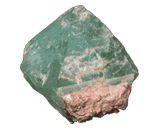 Natural Fluorite Natural Fluorite
Fluorite has a wide range of colors including yellow, blue, pink purple and green. It is an interesting and beautiful gemstone.
Color: Colorless, yellow, brown, green, blue, violet, pink
Categories: semi-precious stone
Chemical Composition: CaF2
Crystal Group: Cubic
Refractive Index: 1.43
Hardness: 4
Density: 3.18
Occurrence: Namibia, U.K., Switzerland, Nigeria, Czechoslovakia, Canada, Poland, Italy, Norway, Germany, U.S.A.
| 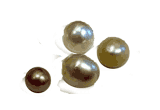 Natural Freshwater Pearl Natural Freshwater Pearl
Freshwater pearls are a kind of pearl that comes from freshwater mussels.Freshwater pearls come in many shapes from round to button shapes, from flat flakes to rice shapes and in many colors. As with the salt water Akoya pearl the round shapes are generally more expensive.
Color: orange, pink, white, gray, light purple, rose, black, brown, gold, yellow, silvery, green, blue, bronze.
Categories: semi-precious stone
Chemical Composition: CaCO3
Crystal Group: Not applicable
Hardness: 3.5 - 4.0
Density: 2.66 – 2.78+
Occurrence: China, Japan
| 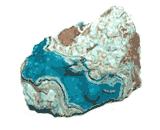 Natural Hemimorphite Natural Hemimorphite
Hemimorphite is a usually white or colorless mineral, essentially Zn4Si2O7(OH)2·H2O, an important ore of zinc. Also called calamine.
Color: Light blue, dark blue, green ,white.
Categories: semi-precious stone
Chemical Composition: (Zn4Si2O7(OH)2.H2O)
Crystal Group: Orthorhombic
Refractive Index: 1.612-1.633
Hardness: 5
Density: 3.44
Occurrence: Franklin and Sterling Hill New Jersey, New Mexico, Montana, Arizona, U.S.A; Congo; Nerchinak in Transbaikalia, Siberia; Zambia; Santa Eulalia and Mapimi, Mexico; England; Wenshan, Yunnan Province, China.
| 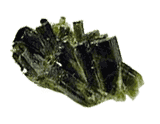 Natural Idocrase Natural Idocrase
Primarily a green color that will resemble jade.idocrase is one stone that is sometimes mistaken for jade by jewelers and consumers alike. Idocrase is from the greek and means mixed form, an allusion to its crystals showing a mixture of other mineral forms.
Color: normally green, but also can be brown, yellow, blue and/or purple.
Categories: semi-precious stone
Chemical Composition: nesosilicate or sorosilicate
Crystal Group: Tetragonal
Refractive Index: 1.71 - 1.73
Hardness: 6.5
Density: 3.3 - 3.5
Occurrence: Quebec, Canada; California and the New England region of USA; Mt Vesuvius, Italy; Ural Mountains, Russia, Switzerland, East Africa
| 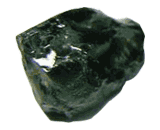 Natural Indicolite Natural Indicolite
Indicolite is a very beautiful stone which is also known as "Blue Tourmaline". It is much different from the other gemstones found in the world.
Indicolite is one of the rarer varieties of elbaite.
Color: Blue
Categories: semi-precious stone
Chemical Composition: (NaCa)(LI,MgFe,Al)9B3Si6(O,OH)31
Crystal Group: Hexagonal
Refractive Index: 1.624(+.005, -.005) - 1.644(+.006, -.006)
Hardness: 7-7.5
Density: 3.06 (.05, +.15)
Occurrence: Brazil, Namibia, U.S.A.
| 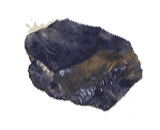 Natural Iolite Natural Iolite
Iolite is a popular and interesting gemstone, and is the gem variety of the mineral cordierite.It has also been called water sapphire because it looks very much like a blue sapphire.
Color: violet, blue, dark blue,
Categories: semi-precious stone
Chemical Composition: MG2AL4SI5O18
Crystal Group: Orthorhombic
Refractive Index: 1.53 - 1.55
Hardness: 7 - 7.5
Density: 2.57 - 2.66
Occurrence: Sri Lanka; Burma; India; Tsivory,Madagascar; Canada; Namibia; Tanzania; Norway; U.S.A.; Brazil
| 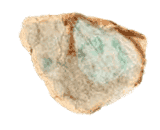 Natural Jadeite Natural Jadeite
A rare, usually green mineral of the pyroxene group. Jadeite can also occur in white, auburn, buff, or violet varieties. The most highly valued form of jade consists of jadeite.Jade has a history in China of at least four thousands years.Experts believe that, although more expensive, diamonds and gold cannot be compared with jade - jade is animated with a soul.
Color: Pure white thru pink, brown, red, orange, yellow, mauve, violet, blue, and black, to an extensive range of green and mottled green and white.
Categories: semi-precious stone
Chemical Composition: NaAl(SiO3)2
Crystal Group: Monoclinic
Refractive Index: 1.654 - 1.667
Hardness: 7
Density: 3.32
Occurrence: Northern Myanmar. Non commercial discoveries of Jadeite have also been reported in China; Russia (in the Polar Urals); Niigata, Japan; San Benito County, California, USA, and Guatemala.
| 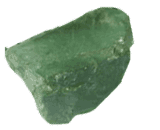 Natural Kornerupine Natural Kornerupine
Kornerupine is a rare mineral occasionally used as a gemstone. It appears frequently in parcels from Ceylon and may be confused with beryl, peridot, topaz, or quartz.
Color: Brown, brownish red, yellow-green, light green, blue green
Categories: semi-precious stone
Crystal Group: Orthorhombic
Refractive Index: 1.665 – 1.683
Hardness: 6.5
Density: 3.25 - 3.35
Occurrence: Ceylon, Tanzania
|
|
